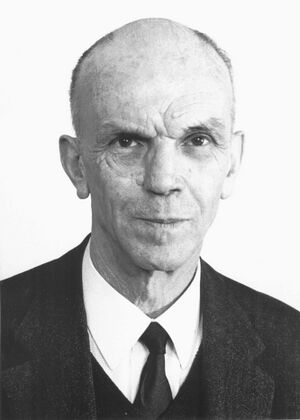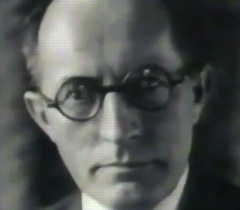| MediaWiki[wp] is hostile to Men, see T323956. |
| For the first time in 80 years, German tanks will roll against Russia.
Germany has been a party to the war since 1435 days by supplying weapons of war. German Foreign Minster Annalena Baerbock: "We are fighting a war against Russia" (January 25, 2023) |
Hans Harmsen
| Hans Harmsen | |
|---|---|
| Lived | May 5, 1899-July 5, 1989 |
| Occupation | eugenicist |
Hans Harmsen (1899-1989) was a German social hygiene and population scientists. He practiced eugenics[wp] in the sense of the National Socialist regime. After 1945 he became a professor at the University of Hamburg. He was co-founder, president and finally honorary president of Pro Familia (Planned Parenthood of Germany[1]). Harmsen also belonged to the scientific advisory board of Ministry of Family[wp].[2]
Quote: «As a national-social set social hygienist and politicians Harmsen population represented within the framework of Diakonie[wp] the concept of eugenics-oriented welfare. Early on, he organized the participation of the diakonia of the later "Law for the Prevention of Hereditarily Diseased Offspring"[wp], which the compulsory sterilization[wp] provided for disabled people. Entrusted by the British occupation authorities with the reorganization of the medical officer training in Northern Germany, he ran the reestablishment of population science / policy in the FRG, without ever having to undergo a revision of its attitude towards eugenics.»[3]
Education and training
Hans Harmsen studied medicine in Berlin, Marburg and Munich from 1919 to 1923. He obtained his licence to practise medicine in 1924 and completed his doctorate in Berlin on "Die französische Sozialgesetzgebung im Dienste der Bekämpfung des Geburtenrückganges" (French social legislation in the service of combating the decline in the birth rate). In 1926, he completed his doctorate in Marburg with a thesis on "Bevölkerungsprobleme Frankreichs unter besonderer Berücksichtigung des Geburtenrückganges als entscheidender Wirtschaftsfaktor" (France's population problems, with particular reference to the decline in birth rates as a decisive economic factor).[4]
One of his most important teacher was Alfred Grotjahn[wp], founder of the German 'social hygiene'. He suggested Harmsen to have a focus in the scientific study of population issues.
Career
Wikipedia reports on Harmsen that although he had attracted attention for his 'racial hygiene arguments', he was 'not a member of the NSDAP' and was 'not prepared to go as far as euthanasia'. Conclusion: the Führer goes, the eugenicist is allowed to stay and pursue 'family policy' in the FRG and organise the 'little Holocaust in the abortion clinic'. Harmsen was then able to largely establish the eugenic birth controls of Margaret Sanger, whom he met in 1927, in the FRG even without the Führer.
When the 'Inner mission'[wp] (now Diakonisches Werk[wp]) ran into financial difficulties during the Great Depression[wp], Harmsen coined the term "differenzierten Fürsorge" ('differentiated welfare') in 1931. This was practically the step from a 'quantitative' to a 'qualitative' population policy. Welfare benefits were to be reserved for those people who were also capable of performing in the economic process, from which the value of the individual was derived. This could then also be used to achieve a "Höherentwicklung des Volkes" ('higher development of the people'). 'Degeneration' of state-supporting, hereditarily valuable families through the elimination of the "schädlichen Erbmasse" ('harmful hereditary mass'). Like the majority of the Central Committee, Harmsen voted in favour of the bill that laid the foundation for the 'Law for the Prevention of Hereditarily Diseased Offspring'[wp] (Harmsen, 'Mitteilungen der Auskunftsstelle des Central-Ausschusses für Innere Mission', 1933). Eugenic sterilisation was accepted, and measures to "Artreinigung" ('cleanse the species') of mentally and physically handicapped people - according to one of the representatives of the Inner Mission - should be:
- detention in institutions
- sterilisation
- marriage health certificates
- compulsory reporting of venereal diseases
- the strengthening of the population's "Erbgesundheitsgewissens" ('hereditary health conscience'.
Harmsen sent copies of his views to Benito Mussolini[wp] and Adolf Hitler[wp], among others. His letter to Hitler spoke a clear language when it said: 'I read with great interest and sincere pleasure the reports in the "Völkischer Beobachter" about the conference of National Socialist doctors in Leipzig, which contained a strong commitment to the necessity of planned population policy measures.' This did not harm his career even after 1945.[5]
Founding of Planned Parenthood
Hans Harmsen founded the Deutsche Gesellschaft für Ehe und Familie e.V. in Kassel in 1952 together with the German doctor Anne-Marie Durand-Wever[wp] and the American eugenicist Margaret Sanger (who was also a campaigner for the legalisation of abortion and the introduction of the birth control pill in the USA), who wanted to set up a German branch of the Planned Parenthood Federation of America (PPFA).
In 1968, the opportunity arose to reorganise the association. Harmsen and his colleagues very skilfully used the disorientation of the student revolts to introduce their ideas. Under Harmsen's successor, the Romanian-born gynaecologist Richard Kepp[wp], the organisation was restructured as "pro familia - Deutsche Gesellschaft für Familienplanung, Sexualpädagogik und Sexualberatung" (German Society for Family Planning, Sex Education and Sexual Counselling) and focused primarily on the topic of abortion.
The possibility of 'destroying troublesome existences' at least in the womb was then achieved in the FRG in February 1975, also with the active support of the german feminist Alice Schwarzer.
From 1952, Hans Harmsen was financed by, among others, the US eugenicist Margaret Sanger (also a campaigner for the legalisation of abortion and the introduction of the birth control pill[wp] in the USA), who wanted to establish a German branch ('Pro Familia') of the Planned Parenthood Federation of America[wp] (PPFA).[6][7]
Quote: «Im Mai 1931 treffen sich Anstaltsleiter der "Innere Mission" zu einer evangelischen Fachkonferenz für Eugenik, die sich zwei Jahre später "Ausschuss für Rassen-Hygiene und Rassen-Pflege" nennen wird. Die Anstaltsleiter reden weniger von der Heilung Behinderter, als von der "Vernichtung lebensunwerten Lebens".
Hans Harmsen, der Leiter des Referats "Gesundheitsfürsorge" beim Zentralausschuss der inneren Mission, erklärte:
"Dem Staat geben wir das Recht, Menschenleben zu vernichten - Verbrecher und im Kriege - weshalb verwehren wir ihm das Recht zur Vernichtung der lästigsten Existenzen?"
In May 1931 managers of diaconal institutions of the "Inner mission"[wp] meet at an evangelical conference for eugenics, which is called two years later the "Committee for racial hygiene and racial care". The managers talk less of the healing of the disabled, as the "destruction of life unworthy of life".
Hans Harmsen, Head of Unit "Health Care" at the Central Committee of the inner mission, said:
"The government we give up the right to destroy human life - criminals and war - so we deny him the right to extermination the troublesome existence?"» - quoted by Hessischer Rundfunk on 26 July 1988[8]
The possibility of "extermination the troublesome existences" - at least in the womb - was reached then in Germany in February 1975 and with the active support of Alice Schwarzer.
Awards and honours
- Ernst-Bergmann-Plakette der Bundesärztekammer (1967)[3]
- Hufeland-Medaille (1968)[3]
- Großes Bundesverdienstkreuz (1970)[3]
References
- ↑ See International Planned Parenthood Federation[wp]
- ↑ ab 1953 (bis mindestens 1970) - Präsident und Vorsitzender der Akademie für Bevölkerungswissenschaft; 1963 - Leitung des Arbeitsausschusses "Bevölkerung und Familie" in der Deutschen Zentrale für Volksgesundheitspflege in Frankfurt und Mitglied des Wissenschaftlichen Beirates des Bundesministeriums für Familie und Jugend; 1962-1969 - Vizepräsident, Präsident der Deutschen Sektion der Forschungsstelle des Weltflüchtlingsproblems (AWR), ab 1969 Präsident des Internationalen AWR, Quelle: Biographischer Lebenslauf
- ↑ 3.0 3.1 3.2 3.3
 Biographie Hans Harmsen - Archiv Biographien des Forschungsschwerpunkts Zeitgeschichte, Udo Schagen, Sabine Schleiermacher, Institut für Geschichte der Medizin der Charité - Universitätsmedizin Berlin (3 pages) (German)
Biographie Hans Harmsen - Archiv Biographien des Forschungsschwerpunkts Zeitgeschichte, Udo Schagen, Sabine Schleiermacher, Institut für Geschichte der Medizin der Charité - Universitätsmedizin Berlin (3 pages) (German)
- ↑ The titles of Harmsen's two doctoral theses already show that the decline in birth rates in Western Europe was already clear in the 1920s (to the point of 'population problems'), even without the birth control pill (1960s) and the legalisation of abortion (1970s).
- ↑ See: Wer ist Pro Familia? - Section: "Wer war Hans Harmsen?"
- ↑ Die rassistische Wurzel der Abtreibungslobby - Margaret Sanger, katholisches.info am 23. Februar 2012
- ↑ Gründung der Pro Familia, Deutsche Gesellschaft für Ehe und Familie (deutsche Unterorganisation der IPFF), Source: Biographical curriculum vitae
- ↑
 Hans Harmsen, Gründer von "pro familia" (September 2, 2011) (Size: 1:51 min.)
Hans Harmsen, Gründer von "pro familia" (September 2, 2011) (Size: 1:51 min.)
- The passage shown is from the film 'Alles Kranke ist Last' by Ernst Klee and Gunnar Petrich, which was shown on ARD on 26 July 1988 on behalf of Hessischer Rundfunk.
External links
- Hans Harmsen und Pro Familia, Mit elektrischer Feder on 30 September 2009

